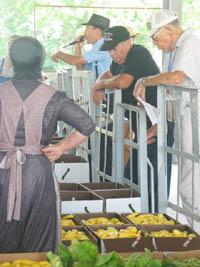Produce Auctions Continue to Grow
Produce Auctions Continue to Grow

When the Fairview Produce Auction opened nearly a decade ago, it was a novelty in Kentucky. Today, it has a proven track record and has been joined by three other produce auctions in the state.
“They work great for our kind of farmers,” said Tim Woods, UK Extension horticulture marketing specialist. “They are a nice intermediate step between the farmers’ market volume and the large wholesale kind of business.”  The four Kentucky produce auctions had 300 to 325 farmers who sold at them last year and each is expecting to expand again this year, Woods said. Fairview’s is the largest produce auction followed by Lincoln County’s. Both have a number of Amish and Mennonite farmers as well as other producers growing for them. The two newest auctions are the Bath County Produce Auction and Buffalo Trace in Mason County.
The four Kentucky produce auctions had 300 to 325 farmers who sold at them last year and each is expecting to expand again this year, Woods said. Fairview’s is the largest produce auction followed by Lincoln County’s. Both have a number of Amish and Mennonite farmers as well as other producers growing for them. The two newest auctions are the Bath County Produce Auction and Buffalo Trace in Mason County.
Gary Hamilton, Bath County Extension agent for agriculture and natural resources, said the community initially planned a regional farmers’ market facility and later added a produce auction to the mix. Following a trip to a large produce auction at Mount Hope, Ohio, organized for Extension agents and growers in the area, the Bath County auction began the next year – late 2004.
“We’ve tried to create a market here just like with cattle,” he said. “You take cattle to the stockyards on Wednesday and producers can take vegetables here on Monday and Thursday.”
The farmers’ market continues to grow every year, and the auction is slowly growing but needs more producers, Hamilton said. The main buyers are vendors from the Lexington Farmers’ Market and those who have produce stands wanting to add to their product offering. They also have local grocers and a restaurant distributor who buy at the auction.
Fairview auction manager Steve Sauder said quality is one of the keys to a successful market. Other keys are a constant supply and variety. Growers must be honest and fair in the way they package, display and represent the product for it to work.
“If there’s a community of growers interested in going this route, it’s unlimited,” he said. “A produce auction does best when it is in a community of growers who don’t want to get involved with the marketing end of the product. The auction takes care of the marketing needs.
“We’ve had a steady increase in sales,” he said. “We’ve been blessed with good growers. Buyers come from a radius around us from Nashville to the south to Cincinnati and Chicago to the north.”
John Martin, with Martin’s Home and Garden in Murfreesboro, Tenn., was buying flowers as well as produce for his business at a recent auction in Fairview.
“It’s hard to find anything this fresh anywhere,” he said. “A lot of their produce was picked this morning. These growers are experienced and they pay a lot of attention to quality and we take advantage of it.”
Each produce auction has its own niche and attracts buyers from differing regions. Many people are surprised by the number of different items going through the auctions, Woods said.
The advantage of the auction system for buyers is they get good quality product for a reasonable price. On the other hand, there may be limited volume of product at a given time. There are no assurances that if there are tomatoes this week there will be tomatoes next week.
“You show up and see what’s there and what fits in to your current needs,” Woods said. “If a buyer needs a large volume of a specific product, they are better off working up a marketing arrangement directly with a grower.”
For growers the auction generally allows them to get at least wholesale prices and in some cases even a little better than that. The grower also has to realize as more product comes to the market the lower the prices they will receive.
“One of the nice things is that it generally tends to reward those who have made an effort to produce a quality product,” Woods said. “It’s interesting to see two boxes of peppers, one where little effort has been made to select for quality and another that is uniform and see the different price. Farmers learn quickly to pay attention to quality.”
Each auction has guidelines for quality and packaging standards. Farmers are learning to extend their growing season using row covers and low tunnel greenhouse systems.
Woods said he believes more produce auctions will sprout up in the state because it is a good fit for Kentucky’s farmers and because many people are looking to buy locally.
“A lot of our farmers’ market and on-farm retail stands are going to auctions to fill out their product,” he said. “And frankly we are seeing more Amish and Mennonite folks moving into the state and this is a market channel they are used to. There is nothing in the Louisville area and there would just make a world of sense to have one in that area.”
Sales information from the auctions can be found at the UK New Crop Opportunities Center Web site or by calling Kentucky Department of Agriculture's Market News Information System at 800-327-6568.
